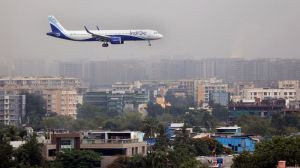Stay updated with the latest - Click here to follow us on Instagram
Supreme Court heat singed even PMO in 2010
High-profile corporate disputes and turf wars kept the judiciary in spotlight this year.
High-profile corporate disputes coupled with the turf war between the judiciary and the executive engaged the Supreme Court in the year 2010 which even saw the Prime Minister facing searching questions for his alleged “inaction” in the multi-crore 2G spectrum scam.
The 2G issue did not only lead to the resignation of A Raja as Telecom Minister but also hit hard Prime Minister Manmohan Singh as his office had to explain to the apex court about his alleged “inaction” and “delay” in taking decision for granting sanction to prosecute the DMK leader.
While the logjam in Parliament over NDA’s demand for JPC probe into the scam continued,the apex court,which had severely pulled up Raja for bypassing the Prime Minister,decided to monitor the probe by directing CBI to widen its compass to cover the grant of licences by both the NDA and the UPA regimes between 2001-2007.
However,before the spectrum scam which according to the CAG report caused a loss of Rs 1.76 lakh crore to the exchequer dragged Prime Minister into the controversy,the UPA regime was in spot over the public distribution system (PDS) in the apex court which castigated it for allowing foodgrains to rot in godown instead of distributing it to the poor.
What irked the apex court were the remarks of union Agriculture Minister Sharad Pawar who had said that the judges had only suggested and not ordered the government to distribute foodgrains free of cost to the hungry.
While the court was lashing out at the Government for failing to properly implement the social welfare measures,Prime Minister utilised the public platform to sent a signal to judiciary to refrain from interfering in policy matters. However,fresh embarrassment came to him and his government when a Bench of Chief Justice of India S H Kapadia questioned the appointment of controversial bureaucrat P J Thomas as the Central Vigilance Commissioner,despite a corruption case pending against him in a Kerala Court.
The apex court is awaiting the Government’s response on whether Thomas,who was a secretary in telecom ministry when spectrum scam surfaced,meets the criteria of person of “impeccable integrity” to don the office of CVC,more so when his name was not cleared by Leader of Opposition Sushma Swaraj.
Thomas might have survived for a while but another constitutional functionary,Prasar Bharti chief B S Lalli failed to secure any reprieve from the top court despite his legal blusters to it and ended up in suspension on the orders of President Pratibha Patil in charges of corruption.
The judiciary had its own moments of embarrassment involving open spat between sitting supreme court judge H L Gokhale and former Chief Justice of India K G Balakrishnan with the two contradicting each other. While Gokhale insisted that Raja’s name was there in the communication to Balakrishnan as CJI,the latter denied it.
The letter was written to bring to the then CJI’s notice that Raja had allegedly tried to influence Madras High Court judge R Reghupathy (since retired) in a bail matter.
The image of judiciary also got the beating as names of judicial officers and judges including one from the Supreme Court surfaced for their alleged misdemeanour in the Uttar Pradesh Provident Fund scam.
The CBI in its report on the probe into fraudulent withdrawal of money from the PF account of the Group III and IV employees of the Ghaziabad district court said there were prosecutable and non-prosecutable evidence against the members of the judiciary and the apex court judge Tarun Chatterjee (since retired) was covered under the second category.
The judiciary also found itself in a fix when the Delhi High Court,in a bold judgement,said the office of the CJI is within the ambit of the Right to Information Act and judges were bound to disclose their assets. Stung by the verdict,the Supreme Court appealed to itself through its registry contending that bringing the office of the CJI under the RTI law will affect its judicial independence and transparency.
And the fag end of the year gave another shocker to the judiciary when a senior apex court judge Markandey Katju raised serious doubts over the integrity of some of the Allahabad High Court judges,saying that “there is something rotten” there.
Keeping up his penchant for hitting headlines,Justice Katju came under severe criticism for using words like “keep” and “one-night stand” in a ruling on live-in relationship. Justice T S Thakur too had concurred with the judgement.
The loud protest was led by Additional Solicitor General Indira Jaising,who was also the architect of the Domestic Violence Act,under which the verdict had been delivered. A day after the ruling,she lodged her vociferous protest in the open court and later filed a petition seeking expunction of the dubious remarks.
The telecom scam involving Raja and his conversation with corporate lobbyist Niira Radia did not only shake the ruling coalition but leakage of the audio tapes caught many on the wrong foot including India’s salt-to-software conglomerate chief Rata Tata,who unsuccessfully rushed to the Supreme Court for stopping further publication of the transcripts.
Some corporate legal disputes too hit the spotlight in the apex court. They included the much-awaited verdict on the gas row between the two Ambani brothers which was reserved on December 18 last year.
Though,a Bench headed by the then Chief Justice K G Balakrishnan,held gas to be the national asset,which had to be priced only by the government,the May 7 verdict clearly made billionaire Mukesh Ambani victorious in the battle with his younger brother Anil whose plea for cheap gas from RIL was rejected.
Anil Ambani,the ADAG boss,also had to bite the dust as the apex court held that Ambani family MOU that sought to divide gas between group firms of the two brothers was not binding,both legally as well as technically.
Besides the Ambani gas dispute,when the telecom sector was under the apex court’s scanner in the Spectrum scam,British telecom giant Vodafone rushed to it against the Bombay High Court order directing it pay Rs 11,000 crores as tax to the Income Tax Department.
Vodafone,however,found itself in a tricky situation as the apex court directed it to first deposit Rs 2,500 crore along with a bank guarantee of Rs 8,500 crore to it,pending adjudication of the dispute.
The year saw the apex court delivering several path-breaking judgements on constitutional issues and one judgement went on to clip Government’s powers,by ruling that Governors cannot be removed with the change of regime at the Centre. The verdict stunned the Congress-led UPA government as it was delivered on a PIL filed in 2004 by senior BJP leader B P Singhal challenging removal of Governors of Uttar Pradesh,Gujarat,Haryana and Orissa by the UPA-I Government.
The five-judge Constitution Bench was unanimous in its verdict in rejecting the Government’s contention that a Governor can be removed for refusing to act as its “agent” and being out of ‘sync’ with its ideology.
However,the verdict which received kudos from the parliamentarians,was on the controversial issue of the MPLAD scheme under which MPs are allocated Rs two crore annually for development of their constituencies as the apex court upheld its constitutional validity saying it cannot be scrapped merely because of allegations of their misuse by some MPs.







